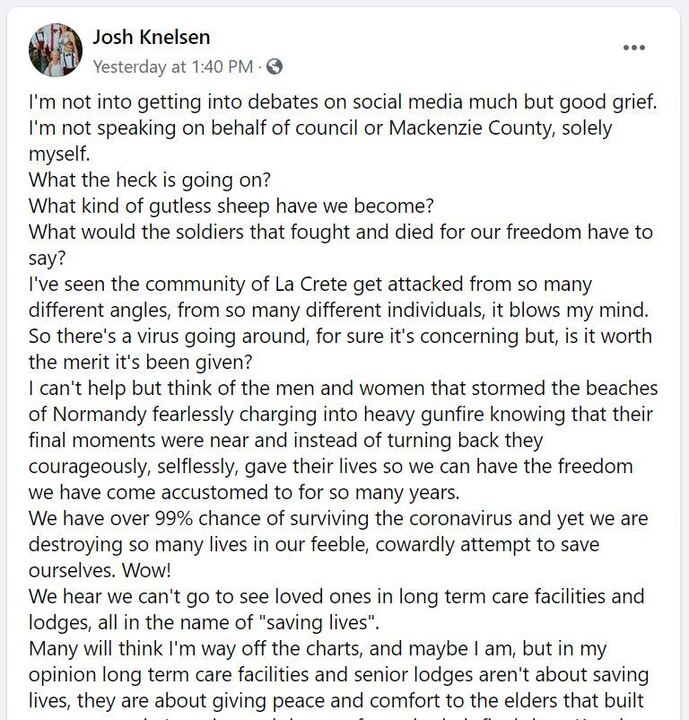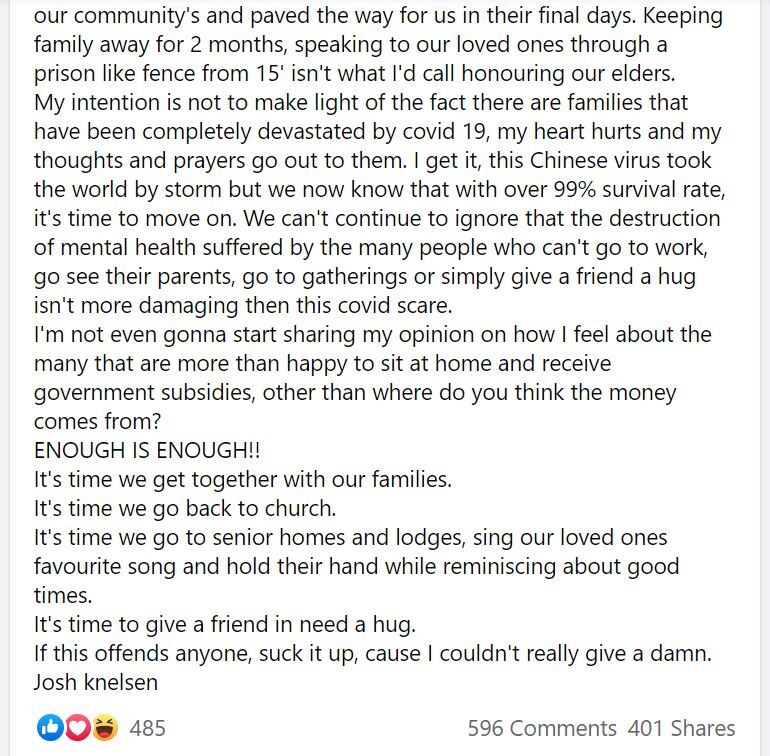The reeve of a northern Alberta municipality took to social media this week to voice his disgust with restrictions brought on by the COVID-19 pandemic, arguing public health measures are taking too much of a toll on people who can’t work or socialize with family and friends.

“What the heck is going on? What kind of gutless sheep have we become?” reads part of Mackenzie County Reeve Josh Knelsen’s post on his personal Facebook page on Monday. “We hear we can’t go to see loved ones in long-term care facilities and lodges, all in the name of ‘saving lives.’ Many will think I’m way off the charts, and maybe I am, but in my opinion, long-term care facilities and senior lodges aren’t about saving lives, they are about giving peace and comfort to the elders that built our community’s (SIC) and paved the way for us in their final days.
“Keeping family away for two months, speaking to our loved ones through a prison-like fence… isn’t what I’d call honouring our elders.”
He goes on to say he thinks it’s time people are able to go back to church, visit seniors’ homes and get together with families.
The reeve’s post also questions what Canadians who died in wars would have to say about COVID-19 restrictions.
At a news conference on Tuesday, Premier Jason Kenney spoke in broad terms about those criticizing his government for being too heavy-handed with public health measures being taken to respond to the pandemic.

Get weekly health news
“I can’t allow emotions or frustration to get in the way of a prudent response based on the data and the best scientific expert advice that we can get, and that’s how we’ve been governing ourselves and we’ll continue to,” he said.
Global News has reached out to Knelsen for further explanation of his views.
READ MORE: Kenney questions arrest of pandemic lockdown protester at Alberta legislature
Knelsen said he was speaking personally and not on behalf of Mackenzie County or council, but Timothy Caulfield, Canada Research Chair in Health Law and Policy, told Global News the comments are concerning because he holds public office.
“Other people who might be frustrated might feel emboldened by this kind of language,” he said on Tuesday. “We also know that these kinds of posts can be shared.
“I understand why people are getting frustrated. The lockdown has been going on for a long time but these measures are both needed and they’re working.”
Caulfield added that he does not believe most Canadians share Knelsen’s views.
Knelsen’s post also claimed the COVID-19 survival rate was 99 per cent, a number that isn’t consistent with the data. On its website, the Word Health Organization says that “while the true mortality of COVID-19 will take some time to fully understand, the data we have so far indicate that the crude mortality ratio (the number of reported deaths divided by the reported cases) is between three to four per cent.”
In his post, Knelsen chose to call the novel coronavirus a “Chinese virus,” a decision some other politicians have made that has not come without criticism or controversy.
The World Health Organization has warned against using geographical descriptors, like the word Chinese, because it can lead to discrimination.
And on the Yale School of Medicine’s website, Marietta Vazquez, the school’s vice-chair of diversity, equity and inclusion for pediatrics, argues that describing the coronavirus in that way is both inaccurate and xenophobic.
“Words matter and the language we use has power,” Vazquez’ post reads. “In the weeks since COVID-19 has been circulating, Asian-Americans and Asians around the world have noted a spike in discrimination and xenophobic attacks.
“This behaviour, and the stigma associated with referring to an illness in a way that deliberately creates unconscious (or conscious) bias, can keep people from getting care they may desperately need to get better and prevent others from getting sick.”
View Knelsen’s post in its entirety below.











Comments